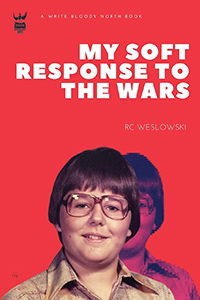Reviews
Poetry Review by David Eso
RC Weslowski, My Soft Response to the Wars (n.p.: Write Bloody North, 2021). Paperbound, 92 pp., $20.
 Rarely does one encounter a debut collection by a veteran poet. My
Soft Response to the Wars offers that opportunity because its author has
made his writing public primarily from stages and through microphones
since the late 1990s. RC Weslowski is the kindly, clowning silverback
of Vancouver’s slam‐poetry and spoken‐word scenes. His
bombastic profundities and zany glee have won him a role as a kind
of Robert Munsch for adults: a healer who plays seer and storyteller
for the overgrown kids living within a certain set of underground literary
tinkerers.
Rarely does one encounter a debut collection by a veteran poet. My
Soft Response to the Wars offers that opportunity because its author has
made his writing public primarily from stages and through microphones
since the late 1990s. RC Weslowski is the kindly, clowning silverback
of Vancouver’s slam‐poetry and spoken‐word scenes. His
bombastic profundities and zany glee have won him a role as a kind
of Robert Munsch for adults: a healer who plays seer and storyteller
for the overgrown kids living within a certain set of underground literary
tinkerers.
The book’s publisher, Write Bloody North, has set out to preserve
spoken‐word artists in book form. In that, it joins in the mandates of
Write Bloody Publishing (of Portland, Oregon) and Write Bloody UK
(established 2020). The American company launched in 2004 and has
made more than 100 books available. The independent Canadian
imprint now has five titles to its credit, including RC Weslowski’s
promising addition to the starting line‐up. Write Bloody North’s previous
releases are by poets Ian Keteku, Lucia Misch, Titilope Sonuga,
and Brandon Wint.
In My Soft Response, edited by Stuart Ross, Weslowski appears as
only a shadow of the prominent oral poet. On stages, embodied recitations
and vocal acuity amplify the writerly craft that forms one part
of his artfulness. Familiarity with his penchant for comedically
inflected silences as well as his expertise as a voice artist may have
bolstered my enjoyment of the book. Those elements of his poetic talent
floodlit my reading—inescapable resonances after seeing his infectious
performances at many arts festivals and poetry events over the
past twenty years or so.
Much of Weslowski’s book concerns the battle to conquer stifling
silence with vital expression. He sees his North American society
plagued by secrecy and falsity. It is “a vampire empire” fed on media
staples like “bad porn and sitcoms.” In that context, creative utterance
becomes a daring, necessary attack from the fringes. Repressive limits
on communication receive vivid and clever descriptions: “an inability
to express / the crushed grape in your chest.” Even so, the sense of
frustration with muted speech and broken connections repeats across
poems to the point where I wanted to hear more of the direct counterforce
that is RC Weslowski (a stage‐ and now also pen‐name). To
dramatize expressiveness and its failures, the book continually returns
to terms for mouths, lips, throats, breaths, voices, and words (spoken
or withheld). The poet feels he has “a fox in [his] mouth” but must spit it out to say so. Weslowski courageously strives to overcome the
strains corrupting communication, which seems to me more valuable
than any primer on the problem of “Shackle Hearted” inarticulateness.
For this poet, making meaningful connections through language risks
a kind of incoherence (“a sacred union of confusion”) that reveals his
exuberant, even unusual spirit. He writes of a “tarantula dairy assassin,”
“Ut Ut Igboo Weasels,” “knuckle‐crumpling disco weavers,” and
“belching on a pickled trumpet.” These are dizzying formulations by
a writer emancipated from the banal, and I found that aspect of My
Soft Response deeply absorbing. And yet, to use a military metaphor
inspired by the book’s title, I sometimes wanted to encounter fewer
targets and more ammunition.
Weslowski’s Response presents outraged and outrageous voices but
also its promised softness. The poet sounds out a spare style in portions
of the book that address personal trauma and healing. Take these aphoristic
lines, seemingly on music: “the only thing you’ve ever loved / that’s
never hurt you.” Consider the poignant image of a boy’s hands “not
folded” but “knotted in prayer.” Pain comes across when the poet shifts
to his quieter tones. Simultaneously, the book’s recurrent commentary
on voicelessness takes on new depths in the blacklight of an unfolding
“history of abuse.” The poems testify to post‐traumatic flourishing;
their flourishes of language are more salvific than decorative. One character
in the book, Floyd Jones, speaks freely. Jones colours his bluecollar
monologue with elaborate and obscene cussing. But his is no
mere foul‐mouthed chin‐waggling. The poet sees Jones’s string of curses
as holy, especially when “compared to the profanities of commerce and
/ the blasphemies of human self‐righteousness.” And so, the enmity
between veiled quietude and gritty volubility is waged on emotional
and political terms in this Soft and not‐so Soft Response. Here, individual
and society suffer or heal together; on that ground, “your joy / is a revolutionary
act / your love, your rage.” RC Weslowski’s battle cry
unleashes “a spirit of fuck you and fuck yeah” that marks his book as
an underground offering, one both furious and loving.
Given the poet’s current track record, we may wait decades before
receiving another print collection to consider, puzzle over, and enjoy.
Meanwhile, the Canadian literary scene can continue to benefit from
his projects outside publishing. These include his regular Wax Poetic program on Vancouver’s Co‐op Radio, his Oh No Not Another Podcast podcast, and his live poetry performances.
—David Eso









